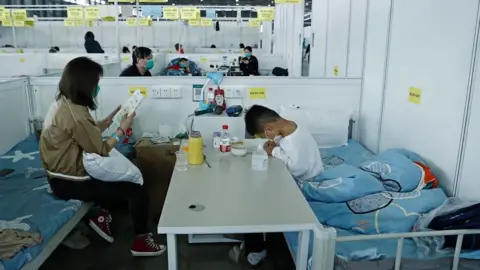China anger over death of girl, 14, sent to Covid quarantine
 Getty Images
Getty ImagesThe family of a 14-year-old girl in China who died after she was put in a Covid quarantine centre are demanding justice, saying their calls for medical help were ignored.
Guo Jingjing, 14, developed a fever two days after being taken to the centre in Ruzhou, Henan province last Friday.
Videos of her shaking and convulsing on a bed sparked an outcry online in China which retains strict pandemic controls.
Her family had shared the clips, appealing for help and accountability.
Officials contacted by the BBC have yet to comment on the allegations or the cause of Guo Jingjing's death, which remains unclear.
In his video, her father Guo Lele said workers at the centre had failed to provide any treatment to Jingjing as her condition worsened.
On Sunday, she had begun to "convulse, dehydrated and shaking", he said in a video uploaded to Douyin, China's local version of TikTok.
"Health workers at the centre took no care of her, no one even inquired," he said in the video, which was widely shared before censors took it down in some places.
Mr Guo's video - and another uploaded by Jingjing's aunt calling for justice - have been increasingly censored in the past 48 hours.
"I'm requesting the Central Committee of the Chinese Communist Party and Discipline Inspection Commission come down to investigate the Ruzhou government's neglect... and give my daughter's life back!" he said, in a video which shows him next to his daughter's body.
The BBC has confirmed Jingjing's death and the circumstances surrounding it with another member of the family too.
They confirmed that the ninth-grader's condition had swiftly deteriorated on Monday afternoon and she was taken to Ruzhou No.4 Hospital that evening.
However she was in a critical condition by then and could not be saved.
Jingjing's death and the circumstances surrounding it have triggered an outpouring online, with people expressing anger over her treatment and criticising President Xi Jinping's Covid policies, which are unpopular with many people in China.
"I'm so angry. Why didn't they just give her a [medicine] pill?" one user wrote. Another said: "It's always like this. Nothing will ever change."
Some referenced a bus crash in September, where 27 people were killed as they were being ferried to a quarantine facility.
However the case has not been reported in Chinese media - which some users attributed to a "media blackout" during an important Communist Party congress this week at which Mr Xi's tenure is expected to be extended.
Ruzhou city officials are yet to issue an official comment. A spokesman told the BBC on Thursday he was personally aware of the case but had no official comment from his superiors.
Local Communist Party officials also declined to respond to BBC inquiries, saying: "Please wait for an official announcement."
China's Covid rules demand that anyone who is infected, or a close contact, must be sent to a state-run quarantine centre.
It's not clear if Jingjing had Covid or if she had been placed in the quarantine site because she was a contact.
The relative said Jingjing had been taken to a quarantine centre set up in a local school and placed in a separate building to her father. Hundreds of other children are being held in such centres across the region - with many separated from their families.
The BBC has heard from four other families who say they've been separated from their children - as young as seven and eight - who are in quarantine on their own in various facilities.
One mother, a Mrs Lu, told the BBC her 12-year-old son was scared and suffering after days in a centre.
"My child can not stand it any more. They [authorities] are not letting them return. He's such a small kid, he can not deal with being alone in one room for such a long time," she told the BBC.
Another parent, Mr Zhu, told the BBC he and other parents were even more alarmed after hearing about Jingjing's death.
Parents have told the BBC they are extremely concerned over the conditions and the lack of proper care for minors in the facilities. Such centres have become known for their lack of staff and resources.
There have also been multiple reports this year of people failing to receive proper medical help in the centres because there are few doctors assigned to such sites.
